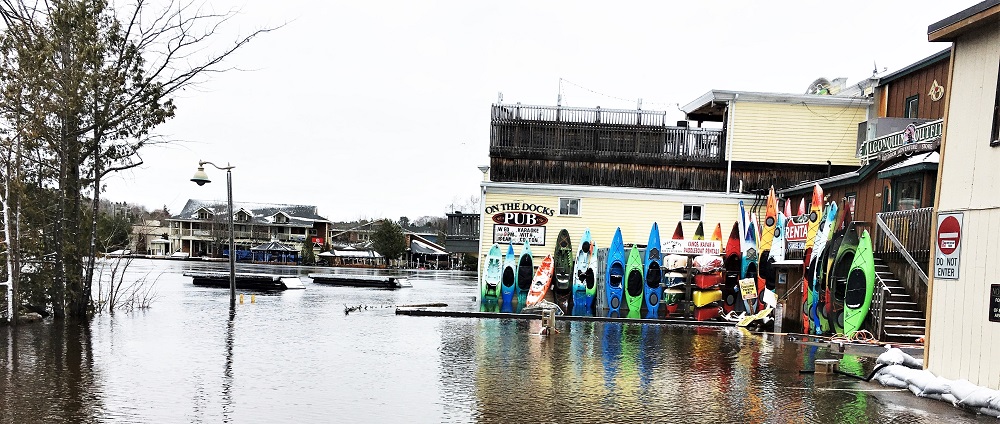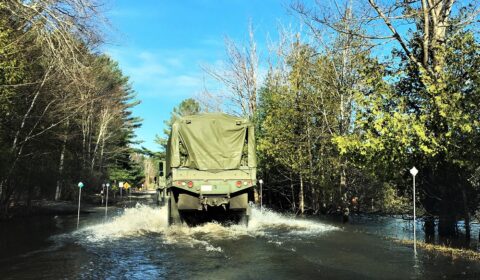2020 FLOOD WATCH BEGINS WITHOUT NEW FORD FUNDING
Mark Clairmont | MuskokaTODAY.com
QUEEN’S PARK — Muskoka flood watchers got good and bad news from the province today.
The Ford government admitted climate change — but didn’t put its money where its mouth is, charges the NDP, after last spring’s massive flooding took out homes and forced hundreds to seek higher grounds, brought in army reserves to help sandbag homes.
It did say it has engaged municipalities, watershed partners and other key stakeholders in Muskoka, Magnetawan and Upper Ottawa River areas on key water management and operational decisions.
However, Solicitor General Sylvia Jones said “I still encourage everyone to review their emergency plan and refresh their 72-hour emergency kit, so you are prepared in the event of an emergency, such as local flooding.”
Natural Resources Minister John Yakabuski told journalists this morning’s announcement was “not about funding,” said NDP Environment critic Ian Arthur in response to the announcement on flood preparedness.
“Ontarians are rightfully concerned about increased flooding events, which experts confirm is a consequence of climate change,” he said in news release just before noon.
“Today’s announcement by Ford’s Minister of Natural Resources makes clear that this government will not reverse its cuts to much-needed flooding prevention programs. In fact, today’s announcement did not include one thin dime.”
Arthur said Ford’s last budget slashed the Ministry of Environment, Conservation and Parks’ annual budget by nearly half. Soon after, the government ordered conservation authorities and municipalities to cut key programs like those that prevent and mitigate flooding by monitoring and supporting watersheds.
Asked Arthur: “How does the minister expect flood prevention to happen if his government has taken the very resources needed to ensure communities and property are kept safe?
“The minister has not only ignored flooding experts’ pleas for government funding, he has ignored the advice of his own special advisor on flooding, whose independent review stressed that Ontario has seen increased flooding due to climate change, and that fresh funding is needed to combat further risks.”
Local Tory MPP Norm Miller was happy with the announcement
“Last spring demonstrated that we need to do more to mitigate the potential for damage caused by flooding in our area,” he said in his release late this afternoon.
“I am pleased that this strategy includes a plan to engage with municipalities and other partners within the Muskoka and Magnetawan watersheds as water management decisions are being made. It also calls for better mapping of flood plains, stricter rules preventing development in flood plains and greater protection of wetlands.”
He said the government’s flood strategy was informed by public consultations and the expert advice of Doug McNeil, Ontario’s Special Advisor on Flooding.
Yakabuski said in his release this morning, that the Ministry of Natural Resources and Forestry Ontario’s Flooding Strategy outlines the province’s next steps to reduce flood risk and help Ontarians be better prepared for flooding events.
He called the strategy “a comprehensive government-wide approach to flooding” that includes the following actions:
Increasing public access to current and timely information to better understand flood risks and how to prepare for flooding events.
Using improved future rainfall prediction data in long-term transportation infrastructure planning.
Reviewing the outcomes of Ontario’s Build-Back-Better pilot project under the Municipal Disaster Recovery Assistance program.
Establishing a multi-partner flood mapping technical team to participate in a review of current flood mapping technical guides.
Working with the federal government to ensure Ontario’s continued access to national funding programs.
The minister’s statement said that since last spring, Ontario “has taken significant steps to help protect people and property from flooding, including:
Obtaining new specialized software for emergency preparedness and response to better track, report and manage incidents and emergencies in the province.
Updating key provincial policies, such as the provision of sandbags to municipalities, First Nations and unorganized territories during a flooding emergency.
Engaging municipalities, watershed partners and other key stakeholders in Muskoka, Magnetawan and Upper Ottawa River areas on key water management and operational decisions.
Proceeding with a climate change impact assessment to better understand how climate change affects Ontario.
Launching a $1 million pilot project under the Municipal Disaster Recovery Assistance program to help eligible municipalities impacted by spring flooding (after March 31, 2019) rebuild damaged infrastructure.
Expediting the approvals process for property owners to repair flood-related damage to shorelines.
Parry Sound Mayor Jamie McGarvey, president of the Association of Municipalities of Ontario (AMO), thanked the province for its “actions” in the government release.
“Municipal governments and our communities are not in this alone. This approach rightly points to improved collaboration between all governments and conservation authorities to protect people and property.”
Steve Clark, Minister of Municipal Affairs and Housing, added:
“In response to last year’s devastating floods, we piloted a ‘build back better’ program through our Municipal Disaster Recovery Assistance to improve municipal flood resiliency. By not having to rebuild the same washed-out road or bridge over and over again, municipalities strengthen public safety and save money in the long term. The recently released Provincial Policy Statement, 2020, also includes changes to help make Ontario more resilient to flooding.”
Jeff Yurek, Minister of the Environment, Conservation and Parks, said: “Our government is committed to protecting our natural environment, communities, businesses and municipalities from the costs and impacts of climate change, such as more frequent extreme weather events and flooding. Working together, we will strengthen our resilience to the impacts of climate change in a way that maintains a healthy environment and a healthy economy.”
The solicitor general said: “The Provincial Emergency Operations Centre actively monitors flood watches and warnings across Ontario. Our emergency officials are in regular contact with all communities when they are affected by flooding to offer support and assistance if needed. Everyone contributes to a safe, secure and resilient Ontario and I encourage everyone to review their emergency plan and refresh their 72-hour emergency kit, so you are prepared in the event of an emergency, such as local flooding.”
A copy of Ontario’s Flooding Strategy can be found at https://www.ontario.ca/page/protecting-people-property-ontarios-flooding-strategy.

Email Mark Clairmont at mark@muskokatoday.com
Celebrating 25 YEARS of ‘Local Online Journalism’
Follow him at Twitter @muskokatodaily
And on Facebook at mark@muskokatodaily.com
Follow us on Twitter @muskokatodaily
And on Facebook at mclairmont1
Email news@muskokatoday.com
Letters to the Editor always welcome:
Let us know what you’re thinking. Click on the Comment button at the end of this story to leave your comments.
Or write a Letter to the Editor …
And … please Subscribe:
Support Your Community’s Newspaper
at https://muskokatoday.com/subscriptions
